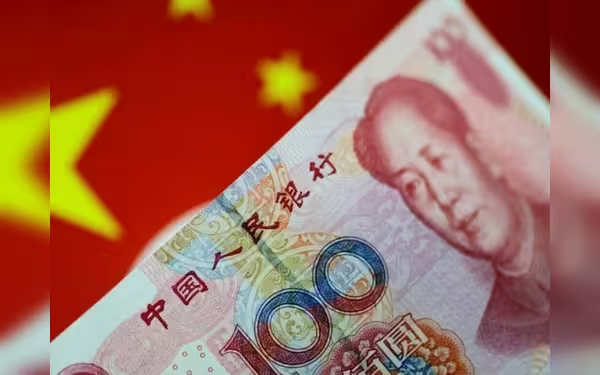Thursday, November 7, 2024 08:38 AM
Yuan Declines as Trump Trade Boosts Dollar Strength
- Yuan trades at 7.1232 against the dollar.
- Trump's potential presidency raises tariff concerns.
- Federal Reserve's policy supports dollar stability.
 Image Credits: brecorder
Image Credits: brecorderThe Chinese yuan declines as the U.S. dollar strengthens amid Trump election concerns and stable Federal Reserve policies.
In recent financial news, the Chinese yuan has experienced a slight decline as the U.S. dollar gains strength. This shift is largely attributed to the increasing likelihood of former President Donald Trump winning the upcoming U.S. election next month. Additionally, there are expectations that the Federal Reserve will maintain its current monetary policy without aggressive easing, which further supports the dollar's position.
As of early Tuesday morning, the yuan was trading at 7.1232 against the dollar, marking a 0.03% decrease. The currency fluctuated within a range of 7.1199 to 7.1260 during the trading session. The spot yuan opened at 7.1240 per dollar, closing 22 pips lower than the previous session. This decline comes as market participants react to the potential implications of a Trump presidency, which could lead to higher tariffs on Chinese exports and increased inflation in the U.S., ultimately benefiting the dollar.
Carie Li, a global market strategist at DBS Bank in Hong Kong, noted, "Markets are watching if Trump trade is heating up and pushing the yuan back to 7.15 against the dollar." This statement highlights the market's keen interest in the political landscape and its potential impact on currency values.
Before the market opened, the People’s Bank of China set the midpoint rate for the yuan at 7.1223 per dollar, which was slightly stronger than analysts' expectations. Despite a rally in September, the yuan has faced challenges this month, dropping 1.5% against the dollar and 0.3% weaker year-to-date. The offshore yuan was trading at 7.1345 per dollar, reflecting a modest increase of about 0.04% during Asian trading hours.
The fluctuations in the yuan's value underscore the intricate relationship between politics and currency markets. As the U.S. election approaches, investors will continue to monitor developments closely, as the outcome could have significant implications for global trade and economic stability. Understanding these dynamics is crucial for anyone interested in the financial markets, as they can influence not only currency values but also broader economic trends.













